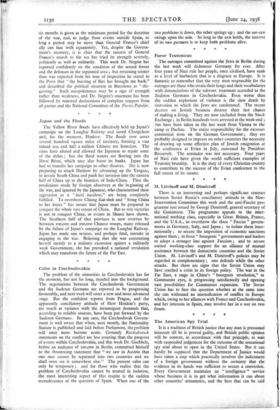M. Litvinoff and M. Dimitroff There is an interesting and
perhaps significant contrast between Soviet Russia's conciliatory attitude in the Non- Intervention Committee this week and the anti-Fascist pro- gramme just issued by Georgi Dimitroff, general secretary of the Comintern. The programme appeals to the inter- national working class, especially in Great Britain, France, and the U.S.A., to overthrow the three " Fascist " govern- ments in Germany, Italy, and Japan ; to isolate them inter- nationally ; to secure the imposition of economic sanctions against them ; to force " bourgeois " governments and leaders to adopt a stronger line against Fascism ; and to secure united working-class support for an alliance of mutual assistance between the democratic countries and the Soviet Union. M. Litvinoff's and M. Dimitroff's policies may be regarded as complementary ; one defends while the other attacks. But there are signs that the Soviet Union may have reached a crisis in its foreign policy. The war in the Far East, a stage in China's " bourgeois revolution," in Communist eyes, is progressing satisfactorily and opening vast possibilities for Communist expansion. The Soviet Union has to face the question whether at the same time she can withstand an intensification of conflict in Europe which, owing to her alliances with France and Czechoslovakia, and her interests in Spain, may involve her in a war on two fronts.
* * *














































 Previous page
Previous page